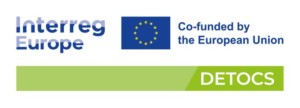DETOCS
Decarbonising the Tourism Industry Post Covid-19 Support
- Duration: 1. phase 1.3.2023–1.3.2026 and 2. phase 1.3.2026–1.3.2027
- Project webpage
- Lead Partner: Local Energy Agency Spodnje Podravje – LEASP (Slovenia)
- Partners: Mediterranean Agronomic Institute of Chania – CIHEAM MAICh (Greece), Region of Crete (Greece), University of Malta (Malta), Ministry for Tourism (Malta), Thermopolis (Finland), Regional Council of South Ostrobothnia (Finland), Municipality of Campobasso (Italy), Regional Energy Agency – Pazardjik (Bulgaria), Burgas Municipality (Bulgaria), Central Danube Development Agency Nonprofit Ltd. (Hungary) ja Middelburg Municipality (Netherlands). Advisory partner The European Institute for Innovation – Technology.
- Funding programme: Interreg Europe 2021–2027
- Total budget: 1,98 M€
The project in short
DETOCS project aims to support the recovery of EU tourism infrastructure sector following the Covid-19 pandemic, amidst the energy crisis, in a sustainable and low carbon way. DETOCS complies with EU long-term policies for the decarbonisation of the economy. During the project implementation, good practices for sustainable tourism will be identified and exchanged amongst partner regions in Slovenia, Greece, Malta, Finland, Italy, Bulgaria, Hungary and the Netherlands; meanwhile, project partners will aim to improve related policy in their regions through capacity building in the participating regions and the adoption of policies proven to be successful in other regions.
The DETOCS project aims to
- facilitate the decarbonisation of the tourism infrastructure
- increase the energy efficiency of tourism infrastructure
- increase the energy self-sufficiency of tourism sector
- promote new and novel types of tourism, which have low energy consumption and carbon footprint (i.e., “virtual tourism”)
- assist regions to cope with the current energy crisis that increases the share of energy cost in their total operational cost threatening their profitability and economic viability.
